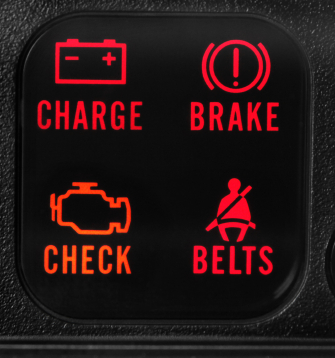
Just about every day, we get asked if the “check engine” light or the ABS (anti-lock brake light) is really important. We have customers that come in and are not concerned about those lights.
The “check engine” light tells so much, it just amazes me. Where else can you have something so complex as a vehicle tell you that something is malfunctioning or about to breakdown.
We had a customer who came in this week for other repairs and said not to worry about the check engine light, he knew that he needed an oxygen sensor but didn’t feel it was important. I spent the time to point out many concerns that I had about this.
First, the “check engine” light comes on when something is malfunctioning or about to breakdown. I could be one of about 100-200 different problems, not to be known until a scanner is hooked up. If more than one problem is present, the light doesn’t light brighter or blink to let you know. It just comes on and stays on. The problem of ignoring it is something that may cause a breakdown or a more expensive repair later. It the least, your car is polluting more than it should.
On this and all vehicles, the oxygen sensor plays a critical role in achieving top fuel mileage with fewer emissions. The way it works is comparing the oxygen of the outside air with the oxygen of the exhaust. With this information, the control unit of the car can adjust the air/fuel mixture to the optimum ratio. A worn O2 (oxygen) sensor not only decreases fuel mileage, it also can ruin a catalytic converter (expensive) if too much hydrocarbons (unburned fuel) reaches it. A bad O2 sensor can also affect the drivability of the vehicle, causing it not to run correctly.
With a check engine light on, it is like calling “wolf” you really don’t know what the problem is and you lose your sensitivity of being concerned. My advice, get it check and repaired, keep your vehicle dependable and running well.
The ABS light is telling you something is malfunctioning with the anti lock part of your brakes. Not having ABS working in an emergency situation is dangerous. ABS will not allow your wheels to lock up, reducing your stopping distance and allowing you’re steering to work during hard braking. Remember, is the front wheel is locked up, your steering wheel had very little input to what direction you car goes. ABS is a wonderful piece of safety equipment, it does save lives.
I also want to touch on how far a car can be driven with the check engine light on. If it comes on, should it get towed or can you continue to drive it.
Great question that I will not be able to answer with precision, there are too many factors to consider. Some problems that trigger the light could be driven 100s of miles, some should not be driven more than two miles. The largest input to this decision making is how bad the vehicle is running. If it is running real poorly, have it towed. If you can’t tell that the engine is running bad, the chances of damage driving it a few miles is decreased immensely. One of the worse cases is driving it when it is running poorly which creates a high amount of hydrocarbons (unburned fuel) into the catalytic convertor. When this happens, the convertor can overheat and melt down. Catalytic convertors are expensive. We have had many times when poor running cars have ruined the “cat”, creating expensive repair bills.